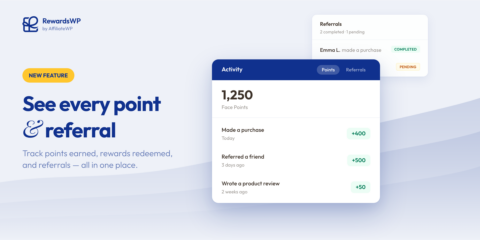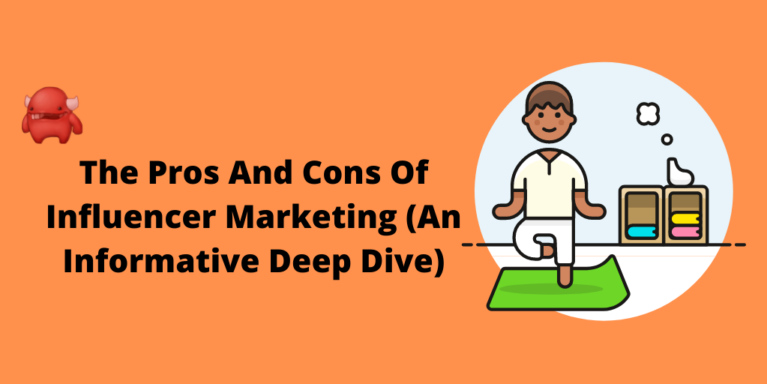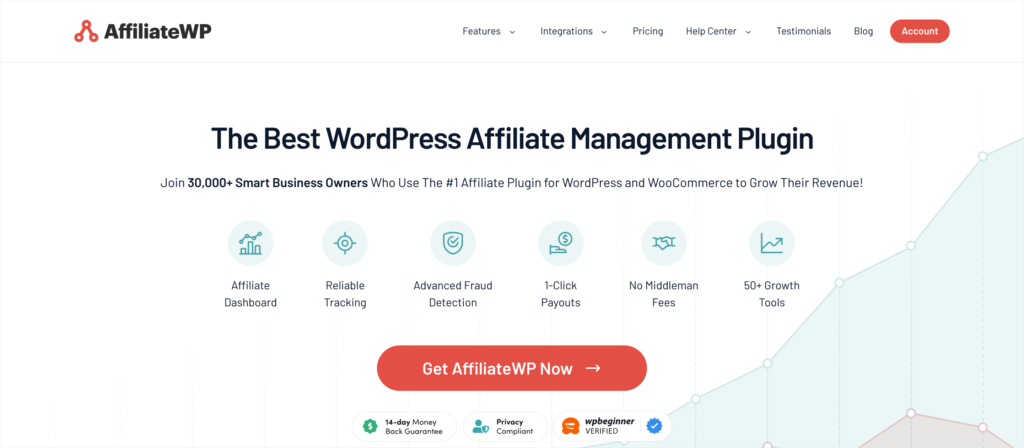
Your Customers Have Points. Now They Have Proof.
Rewards Activity gives your customers a full points history and real-time referral tracking, right inside the rewards widget. Available on all RewardsWP plans.
Continue Reading →
Rewards Activity gives your customers a full points history and real-time referral tracking, right inside the rewards widget. Available on all RewardsWP plans.
Continue Reading →
Want a list of the pros and cons of influencer marketing to help decide if it’s right for you?
Expanding your brand’s reach is a constant challenge and millions of businesses are looking to influencers to solve it. The question is, do the pros and cons of influencer marketing make it worth the effort?
We’re going to look at the major pros:
And balance them against some of the cons:
Here’s what we’ve learned from our experience with influencer marketing.
Influencer marketing is everywhere today, so there must be some serious benefits, right? Let’s take a look at some of the pros of using influencers to market your products.
People think influencer marketing is difficult to set up and especially difficult to track results. This isn’t the case though, as you can set up influencer (affiliate) tracking for your website in minutes.

If your store runs on WordPress, then AffiliateWP allows you to track who referred each sale without the need for any technical skills or knowledge of coding. You simply follow a setup wizard, get your influencers to sign up for a profile, and let them promote your products.
You’ll get real-time analytics that show you who is sending customers to your website, and your influencers will receive a commission when they make a sale. It’s all completely customizable, allowing you to track influencer performance and effortlessly pay out commissions.
Check out the pricing plans and see how easy it is to set up your influencer marketing.
Influencer marketing relies on trust that is created through an established, ongoing relationship between the customer and the influencer.
By contrast, direct sales tactics may seek to convince customers to act on emotional impulses, such as the fear of missing out, or the desire to acquire more resources for their money.
Influencers may still create similar emotional connections and utilize direct sales language, but they often favor the kind of presentation that promotes long-term, sustainable, influential marketing power. They want their followers to come to them first for advice and recommendations within their niche: it’s their business model.
And trust is paramount!
When you work with the right influencers, this trust transfers to your business. The customer trusts your influencer and it’s clear that they trust you, creating an instant relationship.
It’s like meeting the friend of a friend: you’ve got a head start, and that’s a great thing when a customer lands on your product page.
When we think about influencer marketing, two key benefits come to mind:
Influencers are great at creating social proof because they can immediately harness the relationships they’ve built with their followers.
What’s the next part of the equation?
Getting that social proof that your products are amazing in front of the right people.

Look at the figures for average influencer followers:
How many visitors does your website get each month, and how many pages are those visits split between? An influencer can get a single message in front of a staggering number of people, all in one post.
Let’s say you run a company that sells high-quality coffee beans.
What’s more beneficial?
Obviously, this is for you to weigh up, but a key benefit of influencer marketing is that you have the option. You can work with macro-influencers, and you can work with micro-influencers, it’s up to you.
Statistics show that influencers with fewer followers tend to have better engagement rates, but it’s a question of balancing scale with targeting the right audience.
One of the pros of influencer marketing is that influencers tend to come ready-made with many of the skills marketers are looking for.
Influencer marketing isn’t some new trend anyone can get into; it’s a highly competitive industry. To get to the top people have to showcase the same skills you’re looking for to grow your sales:
Influencers tend to have a lot of these qualities precisely because they need them to be successful in their ventures. The learning curve is often lower for influencers when it comes to creating successful marketing partnerships, requiring less support on your end.

This means influencers are ready to hit the ground running. Bringing your message to your target audience almost immediately and creating a buzz around your products.
As with anything, there are scales here.
If you’re going to work with an influencer who has millions of followers, then you’re going to have to be prepared to pay up! However, there are lots of smaller influencers out there who you can start working with without having to invest too much.
The other reason influencer marketing can be very cost-effective is that you can link it to your affiliate marketing program. There’s really not a lot of difference between influencer marketing and affiliate marketing, and you can find plenty of influencers who are willing to be paid based on the sales they create.
By finding influencers who are willing to be paid in free products, or through a commission on sales, you can get started with influencer marketing with almost no start-up costs.
Influencer marketing is a format for the modern world.
Think about it: an influencer’s social media post or YouTube video is the combination of a testimonial, call-to-action, and demonstration. All of this in something that grabs people’s attention and maximizes the short time available.
Throw in the incredible power of social proof and you’ve got a powerful recipe for sales.
Brands can earn as much as $18 per dollar spent on influencer marketing when it’s done right. Be aware that the average is nearer $5 though!
The pros of influencer marketing sound pretty good, but there are some challenges you’ve got to overcome. As you’ll see, none of these drawbacks are insurmountable, but they show that running a successful influencer marketing campaign takes a clear focus.
Influencer marketing allows you to piggyback on the trust people have in your influencer, but it is possible to appear like you’re exploiting like this.
We’re seeing large-scale examples of this with things like greenwashing. When companies with questionable green credentials try and align themselves with green initiatives and influencers, it’s often seen as a cynical move to exploit the consumer.

On a smaller scale, you have to make sure that your brand is aligned with the ideals of your influencer and their target audience. If it’s clear there’s no alignment, then the authenticity of your connection with the influencer will be immediately questioned.
Choosing the right influencers is extremely important!
When you work with an influencer, you’re giving up some control over your brand. There’s no way around this unless you make everything extremely scripted, and then you lose some of the authenticity.
Branding is one of the most powerful tools businesses have, and it’s something they work extremely hard on.
One slip up from a prominent influencer can have a big impact on that brand image.
People are unpredictable. You can spend a large amount of money to align your brand with someone with a squeaky clean image, but you don’t know what they’re going to do tomorrow.
One of the reasons influencer marketing works is because people transfer some of the feelings they have for the influencer onto the product they’re promoting. What happens, for example, if that influencer commits a high-profile crime?
The chances are probably low, but brands have suffered from these things.

Think about Johnny Depp’s high-profile court case, and the difficult position this put brands he promoted in.
One of the differences between influencer marketing and affiliate marketing is that influencers often get paid up-front whereas affiliates take a commission on each sale they help make.
One of the drawbacks of this is that it can be difficult to measure results.
This doesn’t have to be the case though as link tracking is extremely easy to set up.
Yes, we hear you say, “affiliate links are ugly, influencers don’t want to use them.” Again though, it doesn’t have to be this way as you can allow your influencers to customize their links with Custom Affiliate Slugs.
Once someone clicks on the link, AffiliateWP takes care of all the tracking for you. You’ll know:
The same is possible with Vanity Coupon Codes which allow your influencers to showcase their own exclusive discounts.
Out of all the cons of influencer marketing, this one’s by far the easiest to overcome!
Life happens! Everything you do with your business has an element of risk, it’s about putting processes in place to limit that risk.
Sure, there are cons associated with influencer marketing, but you can limit them with the right processes. A key part of this is seeing your influencer marketing as a program and approaching it with a methodical strategy.
AffiliateWP allows you to do this, creating a perfect environment for you to carry out due diligence and track your results. When you work with the right influencers and can demonstrate results, influencer marketing is a powerful tool, so it’s time to get started.
Want more great resources?
We’ve got you covered:
Disclosure: Our content is reader-supported. This means if you click on some of our links, then we may earn a commission. We only recommend products that we believe will add value to our readers.
Launch your affiliate program today and unlock a new revenue channel to grow your business faster.
We use cookies to improve your experience on our site. By using our site, you consent to cookies.
Manage your cookie preferences below:
Essential cookies enable basic functions and are necessary for the proper function of the website.
These cookies are needed for adding comments on this website.
Easy Digital Downloads is a WordPress plugin for selling digital products effortlessly and managing transactions.
These cookies are used for managing login functionality on this website.
WPForms is a user-friendly WordPress plugin for creating custom forms with drag-and-drop functionality.
Statistics cookies collect information anonymously. This information helps us understand how visitors use our website.
Google Analytics is a powerful tool that tracks and analyzes website traffic for informed marketing decisions.
Service URL: business.safety.google (opens in a new window)
Clarity is a web analytics service that tracks and reports website traffic.
Service URL: clarity.microsoft.com (opens in a new window)
Marketing cookies are used to follow visitors to websites. The intention is to show ads that are relevant and engaging to the individual user.
OptinMonster is a powerful lead generation tool that helps businesses convert visitors into subscribers and customers.
Service URL: optinmonster.com (opens in a new window)
An excellent article that helps a new affiliate marketer like me. I learnt a lot from this article
Glad to hear it, Gerard!